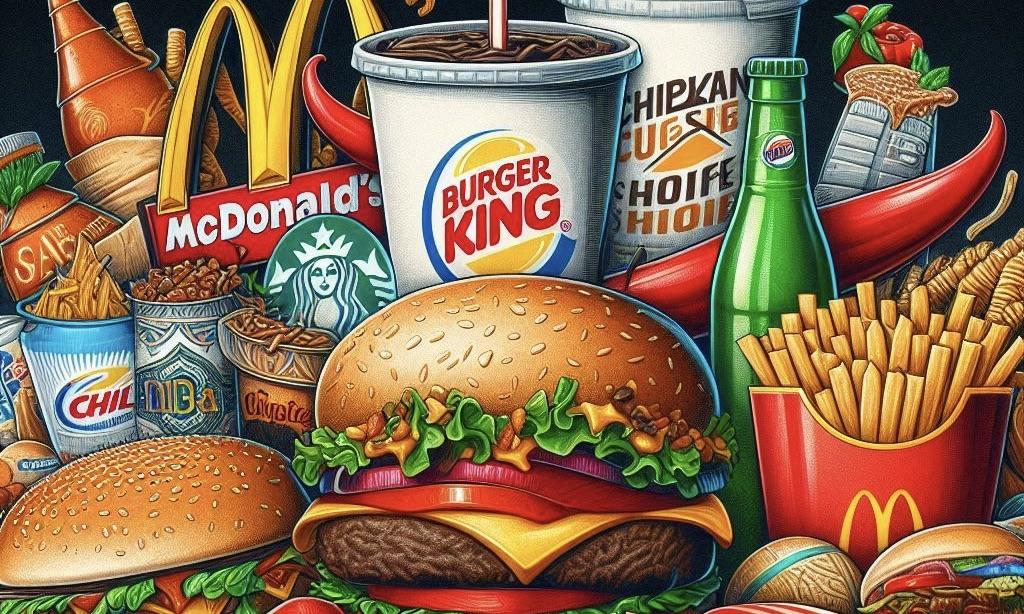As the summer heats up, fast-food chains launch aggressive value meal promotions to attract budget-conscious diners. The latest trend is that major players like McDonald's, Taco Bell, Burger King, and Wendy's are reviving the $5 price point to regain foot traffic and boost sales amid economic uncertainty.
Reviving the $5 Meal Deal
A decade ago, Subway began phasing out its popular $5 footlong sandwiches. Today, other fast-food giants are bringing back the $5 meal deal to entice customers who have tightened their spending. This strategy is in response to a notable decline in customer visits and sluggish sales reported by many restaurant companies in their second-quarter results. Chipotle remains a rare exception, showing resilience amid the broader industry's downturn.
Despite the efforts to attract more customers, Wall Street remains skeptical. McDonald's, for example, has seen an uptick in traffic due to its $5 promotions, but analysts are not expecting a significant sales surge from these deals.
Economic Pressures and Changing Consumer Behavior
Historically, fast food has performed better than other sectors during economic downturns. However, the recent trend of price hikes has led many consumers to view fast food as less of a bargain. A LendingTree survey found that over 60% of respondents have cut back on fast-food spending due to high costs. This shift has particularly impacted low-income customers, a critical fast-food-chain demographic.
In response, casual dining establishments like Chili’s have marketed their offerings as better value alternatives to fast food. This strategy has helped casual dining chains capture some market share from fast-food outlets. According to Darden Restaurants CEO Rick Cardenas, this shift in consumer behavior is evident in their increased patronage.
Investor and Franchisee Reactions
The decline in fast-food patronage has not gone unnoticed by investors. Shares of McDonald's, Burger King parent Restaurant Brands International, and Wendy's have dropped double this year. Taco Bell owner Yum Brands has also seen a slight decline, while the S&P 500 has risen by 14% in 2024.
Franchisees, who often bear the brunt of promotional costs, are also wary of the new value meal deals. Many have resisted such initiatives, fearing they will erode profits. McDonald's franchisees, for instance, formed the National Owners Association in 2018 to oppose the company's discount strategies.
Can Value Meals Drive Bigger Purchases?
Fast-food chains typically offer discounts and value meals in the first quarter to attract post-holiday, budget-conscious consumers. However, this summer, the need for discounts has extended into the warmer months to drive traffic and sales growth.
The objective is to increase customer visits and convert bargain hunters into higher-ticket buyers through additional purchases. Without this conversion, the discounts risk becoming unsustainable and further straining profits.
The Subway Cautionary Tale
Subway’s $5 footlong deal, once a customer favorite, ultimately led to profit erosion and operational challenges, resulting in restaurant closures and disgruntled franchisees. This history is a cautionary tale for current fast-food chains relying heavily on value meals to drive sales.
Market Outlook and Future Earnings Reports
McDonald's is set to report its second-quarter earnings on Monday, with Wendy's following on Wednesday. Restaurant Brands and Yum Brands will release their quarterly results the following week. Analysts anticipate underwhelming performance reports, reflecting broader industry struggles.
Conclusion
The fast-food sector is fiercely competing to attract low-income diners with summer value meals. As economic pressures mount, these promotions aim to stabilize traffic and sales. However, the long-term viability of such strategies remains uncertain, raising concerns among investors and franchisees alike.



 Trump Orders Federal Agencies to Halt Use of Anthropic AI Technology
Trump Orders Federal Agencies to Halt Use of Anthropic AI Technology  Lynas Rare Earths Shares Surge on Strong Half-Year Earnings and Rising Global Demand
Lynas Rare Earths Shares Surge on Strong Half-Year Earnings and Rising Global Demand  Middle East Airspace Shutdown Disrupts Global Flights After U.S.-Israel Strikes on Iran
Middle East Airspace Shutdown Disrupts Global Flights After U.S.-Israel Strikes on Iran  Paramount Skydance to Acquire Warner Bros Discovery in $110 Billion Media Mega-Deal
Paramount Skydance to Acquire Warner Bros Discovery in $110 Billion Media Mega-Deal  Netflix Stock Jumps 14% After Exiting Warner Bros Deal as Paramount Seals $110 Billion Acquisition
Netflix Stock Jumps 14% After Exiting Warner Bros Deal as Paramount Seals $110 Billion Acquisition  FCC Approves Charter Communications’ $34.5 Billion Acquisition of Cox Communications
FCC Approves Charter Communications’ $34.5 Billion Acquisition of Cox Communications  Snowflake Forecasts Strong Fiscal 2027 Revenue Growth as Enterprise AI Demand Surges
Snowflake Forecasts Strong Fiscal 2027 Revenue Growth as Enterprise AI Demand Surges  Amazon’s $50B OpenAI Investment Tied to AGI Milestone and IPO Plans
Amazon’s $50B OpenAI Investment Tied to AGI Milestone and IPO Plans  OpenAI Hires Former Meta and Apple AI Leader Ruomin Pang Amid Intensifying AI Talent War
OpenAI Hires Former Meta and Apple AI Leader Ruomin Pang Amid Intensifying AI Talent War  FedEx Faces Class Action Lawsuit Over Tariff Refunds After Supreme Court Ruling
FedEx Faces Class Action Lawsuit Over Tariff Refunds After Supreme Court Ruling  Panama Investigates CK Hutchison’s Port Unit After Court Voids Canal Contracts
Panama Investigates CK Hutchison’s Port Unit After Court Voids Canal Contracts  BlueScope Steel Shares Drop After Rejecting Revised A$15 Billion Takeover Bid
BlueScope Steel Shares Drop After Rejecting Revised A$15 Billion Takeover Bid  Boeing Secures $166.8 Million U.S. Navy Contract for P-8A Engineering and Software Support
Boeing Secures $166.8 Million U.S. Navy Contract for P-8A Engineering and Software Support  Trump Media Weighs Truth Social Spin-Off Amid $6B Fusion Energy Pivot
Trump Media Weighs Truth Social Spin-Off Amid $6B Fusion Energy Pivot  Hyundai Motor Group to Invest $6.26 Billion in AI Data Center, Robotics and Renewable Energy Projects in South Korea
Hyundai Motor Group to Invest $6.26 Billion in AI Data Center, Robotics and Renewable Energy Projects in South Korea  Trump Warns Iran as Gulf Conflict Disrupts Oil Markets and Global Trade
Trump Warns Iran as Gulf Conflict Disrupts Oil Markets and Global Trade 































